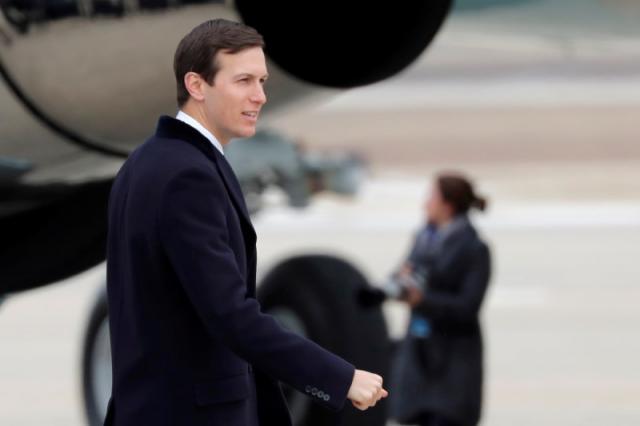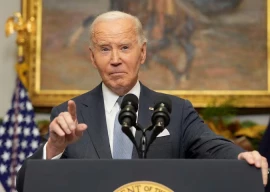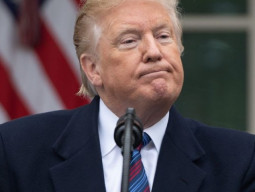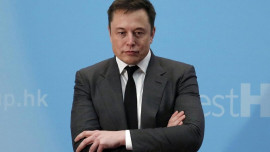
Kushner, who is married to Trump’s daughter Ivanka, spoke in an interview with the Palestinian newspaper Al Quds, the Arabic name for Jerusalem.
In the interview, which was headlined, “I am ready to work with President Abbas, if he wishes” and published in Arabic, Kushner gave a direct message to the Palestinian people: “You deserve to have a bright future, now is the time for both the Israelis and Palestinians to strengthen their leaderships and re-focus them to encourage them to open up towards a solution, and not fear trying,” the newspaper reported.
Israeli troops kill Palestinian in West Bank clashes
Washington has said it has a peace plan, but Abbas has refused to meet with Trump’s team following his decision in December to recognize Jerusalem as the capital of Israel and to move the US Embassy there. The Palestinians want their own future state with a capital in East Jerusalem.
Kushner, who has taken the lead on Trump’s plan, said he did not “wish to talk about the details of the deal that we’re working on.” But he said it would be ready 'soon.'
“If President Abbas is ready to go back to the negotiations table, then we are ready to participate in the discussion, but if it’s not the case, then we are going to make the plan public.”
He added: “I believe that in order to reach an agreement, both parts are going to gain more than they’re giving, and both sides will feel confident that the life of their people will be better decades from today because of the concessions that they’re offering.”
The article was published after the White House confirmed that Kushner and Trump’s Mideast envoy Jason Greenblatt met on Saturday in Jerusalem with Prime Minister Benjamin Netanyahu of Israel and US Ambassador David Friedman “to continue their discussions that began on Friday.”
Body of assassinated Palestinian given emotional send-off
Kushner and Greenblatt’s trip to Jerusalem followed a regional tour that included Jordan, Egypt and Qatar. They also held talks in Saudi Arabia, which does not recognize Israel but shares its enmity toward Iran.
The White House has offered few details on a plan that has drawn widespread skepticism even before its unveiling. Most experts question whether Kushner and Greenblatt, both of whom had no prior diplomatic experience, can achieve any deal.
Kushner’s remarks to Al Quds, in what the paper billed as his first newspaper interview on the administration’s Middle East initiative, highlighted the Trump administration’s attempts to deliver a message directly to the Palestinian people, when their leaders have refused to meet with the US team.
Asked by the paper what Arab leaders had told him, Kushner said they “clarified that they want to see a Palestinian State with East Jerusalem as its capital. They want an agreement that enables the Palestinian people to live in peace, and to have the same economic opportunities that their people enjoy.”
Israeli troops fire shots, tear gas at Gaza protesters, 350 Palestinians hurt
He added: “They want to see a deal that respects the dignity of the Palestinians, and puts an actual solution to the issues that have been discussed for decades. They all insist that al-Aqsa Mosque should continue to be open to all Muslims who wish to pray.”
Kushner emphasized the economic benefits of a deal, saying that he believed “we can attract large investments in the infrastructure from both the private and the public sectors” to improve the Palestinian economy.
Asked by Al Quds editor-in-chief Walid Abu-Zalaf how his plan differs from those that came before, Kushner said he and his team had “spent a lot of time listening, and focusing on the people.”
Challenged on the assertion by an Abbas aide that the American plan was “a waste of time and is destined to fail,” Kushner said he believed that the Palestinian leadership said such things “because it’s afraid that we are going to publish our peaceful plan that will be liked by the Palestinian people.”
He said he had not been in direct contact with Abbas, but that intermediaries had passed on messages.
Kushner also made remarks critical of Abbas. The Palestinian lead, Kushner said, “says that he is committed to peace, and I don’t have any reason to disbelieve him.” But he added: “I question President Abbas’ ability, or desire, to finish the deal. He has the same talking points that haven’t changed in the past 25 years. A peace hasn’t been achieved during that period.”
Asked about the situation in Gaza, which is controlled by Abbas’ rivals, the Islamist militant group Hamas, Kushner said: “What is happening in Gaza is very sad. The situation started before President Trump came into power but we have to try to make improvements. The level of despair reveals the worst scenario that can happen when things are left without a solution and when it is allowed to continue.”
He said Gazans were “hostages to a bad leadership” which was unable to engage with the international community. Hamas is regarded as a terrorist organization by Israel and the United States.
The plan is expected to propose detailed solutions to core issues in dispute between the Israelis and Palestinians, such as borders, the future of Israeli settlements, the fate of Palestinian refugees and security.
The Trump administration has said it would support a two-state solution if both sides agree to it, but in the interview Kushner did not commit to a two-state solution.
Pressed by the interviewer on the 'traditional' issues, as opposed to the economic concerns that he had focused on, Kushner did not go into detail, but said “the fundamental traditional issues are very important” and that his team appreciated “the historical differences between the two sides.”
He added: “We are committed to finding a package of solutions the two sides can live with. Resolving fundamental issues without creating a path for a better life will not lead to a lasting solution.”




1736599343-0/fizza-(8)1736599343-0-165x106.webp)



1736605969-0/Copy-of-Untitled-(7)1736605969-0-270x192.webp)


1736508423-0/Express-Tribune---News-Desk-(9)1736508423-0-270x192.webp)

1736495887-0/sidra--(63)1736495887-0-270x192.webp)









COMMENTS (1)
Comments are moderated and generally will be posted if they are on-topic and not abusive.
For more information, please see our Comments FAQ